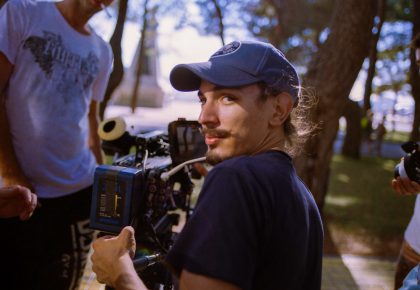
Beginning today and during the 41st Chicago Latino Film Festival, our communications manager and film critic Alejandro Riera will be posting a series of interviews with a select number of filmmakers whose films will screen during our eleven-day event. Through these interviews, filmgoers will learn about the film’s origins, its making of, and the challenges faced by these artists when bringing their visions to the screen.
We begin the series with Alexandra Latishev Salazar, writer and director of Delirio, a film that uses the tropes of the traditional haunted house story as well as such Russian folk myths as the vourdalak to explore the psychological impact of domestic violence on three generations of women.
Daughter of a Costa Rican mother and Russian father, Latishev Salazar discovered film through her father’s Soviet film archives. She graduated from the New Film and Television School at Universidad Véritas in San José, Costa Rica and in 2013, made her graduation film Irene. Her documentary Los Volátiles (2014), about a 26-year old man with a mental disability who looks for stability in his life, won the award for Best Documentary Feature and the Audience Award at the Costa Rica Festival Internacional de Cine. In 2017 she released her feature debut, Medea, which was selected for the Cine en Construcción section at the 2016 San Sebastián International Film Festival and represented Costa Rica at the Oscar and Goya Awards, before participating in festivals in over 25 countries. She also La Linterna Films, a production company dedicated to film development.
Today, Latishev Salazar, alongside Antonella Sudasassi Furniss (whose new film Memories of a Burning Body is also representing Costa Rica in the Fest) and Nathalie Álvarez Mésen (Clara Sola), is part of a new cinematic wave led by women that is throwing a spotlight on that country’s vibrant and creative film scene:

In Delirio, you, through 11-year-old Masha, make several references to Easter European and specifically Russian folk tales and myths such as the vampiric Vourdalak. How were you introduced to these tales and how influential were they?
All these tales were part of my childhood, they were the books they read to me when I was little, as a daughter of a Russian immigrant. The Russian children tales have the same essence of Russian literature, it is full of nihilism and I like to use this concept of the “vourdalak”, because they are vampires that attack their own family. I believe that the cycles of violence inside the families are the same as vampires. You aren’t born a vampire, they make you one after they attack you and then you make other people vampires when you attack them.
In the film’s press notes, you mention the impact domestic violence had on your mother and grandmother, that they lived with “persecutory delusions”. The film itself feels like an exorcism of sorts. Why did you feel now was the right time for you to tell this very personal story?
What a difficult question. I don’t think it was a very conscious decision. I started writing a film about characters in certain circumstances, and as I wrote it, my personal story began to emerge like a ghost. I think it often happens when you write or make films: you start in a place that seems foreign, but as you go deeper into the story, you appear there somehow, but I think in that moment the film becomes more interesting. Still it’s difficult to feel so exposed, but at the same time it gives you some kind of release.
Tell us a little bit about the process of casting: what were you looking for and how did Liliana Biamonte (Elisa), Helena Calderón (Masha) and Anabelle Ulloa (Dinia) fit with your vision? What else did they bring to their roles?
I have the privilege of working with excellent actresses. I’d worked with Liliana on several previous films already, but finding Helena and Anabelle took months. With Helena, we developed a casting process with girls of some Russian origin, which was very unique for a country like Costa Rica. Working with the actors is one of the main focuses of my work. The rehearsal process lasted about eight months, during which we did many things: we filmed short exercises that the actresses wrote about their characters’ stories, we rehearsed scenes from the past of the characters, we drew a lot, we did yoga, we even took long walks in the woods. I think it’s important to build a bond of trust with the actresses to get to a deeper level of intimacy, which is only built over time.
There are two levels of violence in the film: one level is hinted at through small visual cues, through music, through the use of space. It’s about the psychological impact. Then there’s the one that is expressed through words, particularly through the grandmother’s despicable words towards her carekeeper. Could you elaborate?
I’m fascinated by how clearly you interpret this second level of violence, because it’s perhaps the most imperceptible, but for me it’s the most interesting and is related to my grandmother and cultural themes. My grandmother came from a very poor family; all her life she was subjugated in some way: due to her social class, her low level of education, the relationship she had with the carekeeper was perhaps the only relationship where she exercised power in any way. It’s also permeated by an aspirational discourse of “white” superiority, because people in Costa Rica consider themselves “whiter” than other Central American nations, with fewer indigenous genes, which is ridiculous.
Has the film been released theatrically in Costa Rica? How about other festivals? What has been the response?
The response has been positive, despite the fact that audiences in Costa Rica are quite conservative. I think there are new initiatives that have taken on the task of creating an audience that seeks out more alternative cinema. Each film follows its own path and is quite unpredictable, yet it’s always full of surprises and beautiful experiences because the film resonates in places you never expected.
Delirio will screen on Wednesday April 9 at 8:30 p.m. and Friday, April 11, 5:45 p.m. alongside the Honduran short La Llorona by César Laing at the Landmark Century Center Theatres.

